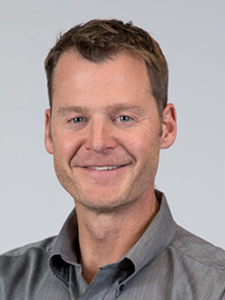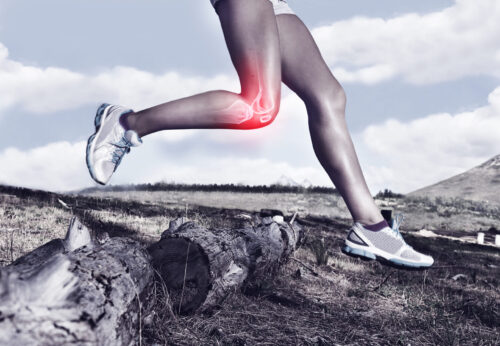By the time we’re 50, our knees have carried us more than 75,000 miles. Most of us don’t give our knees a second thought—until degenerative knee arthritis takes its painful toll and limits our day-to-day activities.
Knee osteoarthritis occurs when the knee joint’s cartilage—a smooth, slippery substance that lines the ends of bones—wears away. “Healthy, normal cartilage allows the ends of bones to roll and slide easily against each other during motion,” explains Boulder Medical Center orthopedic surgeon Dr. Michael Repine. “Unfortunately, too much wear on the cartilage surface leads to its deterioration, similar to how the tread on a car’s tires wears down over time.”
Speaking at a recent Boulder Community Health lecture series, Dr. Repine explained: “Osteoarthritis of the knee is the mechanical wearing down of the cartilage surface. When the cartilage is thinned or absent, problems such as pain, swelling, instability, and limited motion occur.”
Fortunately, there are many approaches for relieving the pain of knee arthritis, from non-surgical treatments to new surgical options.
Knee Arthritis Symptoms
The symptoms of knee arthritis can include:
-
- Knee Pain
- During weight-bearing activities
- While sleeping at night
- Located across the entire knee or focally to an area
- Usually slow in onset, with a gradual increase
- Inflammation in the Knee
- Warmth in the joint
- Swelling or stiffness, which can be more pronounced after a period of inactivity
- Limited Motion
- Loss of flexibility or restricted range of motion in the joint
- Overall weakness, causing the knee to give way or buckle
- Grinding, creaking, cracking, or popping sounds during movement
- Knee Pain
Non-Surgical Treatments for Knee Arthritis
According to Dr. Repine, physical therapy is almost always the first step in treating knee arthritis, reducing pain, and improving range of motion and strength. He describes non-surgical treatments and the pros and cons of each:
-
- Nonsteroidal Anti-Inflammatory Drugs (NSAIDs)
- Pros: Decreases inflammation and pain
- Cons: When used long-term, there is a risk of gastrointestinal bleeding
- Nutritional Supplements
- Pros: Many sufferers find nutritional supplements, such as glucosamine and chondroitin, helpful
- Cons: Too many of these products don’t measure up to their claims and data on proven effectiveness. None have passed FDA testing as proven effective. Dr. Repine recommends conducting your personal trial study to see if a supplement works for you.
- Cortisone Injection
- Pros: Relatively well-tolerated, easy procedure done under fluoroscopy offers a predictable reduction in pain. It often “buys time” for patients whose joints aren’t ready for total replacement.
- Cons: The injection must be placed carefully, and the cartilage can be softened. Also, it tends to mask symptoms.
- Viscosupplement Injection (hyaluronic acid)
- Pros: It protects remaining cartilage and helps improve the joint’s biochemical environment, offering a reliable reduction in pain.
- Cons: None, with appropriate patient selection. However, there’s a small potential for reaction with repetitive administration.
- Stem Cell Therapy
- Pros: Anecdotal reports appear promising when Osteoarthritis is caught early.
- Cons: It’s expensive, and its uses are still being heavily researched.
- Nonsteroidal Anti-Inflammatory Drugs (NSAIDs)
Surgical Treatment for Arthritis | Mako Robotic Arm-Assisted Surgery
Many people with knee osteoarthritis look to surgery as a way to get relief from bone-on-bone pain and resume the physical activities they love. Arthritis located in a well-defined area is most often treated arthroscopically. Sometimes, cartilage transplantation or resurfacing can also be an option.
“For these surgical treatments to be effective, we must catch the damage early on, before any secondary bone changes occur,” says Dr. Repine. “You can ‘miss the boat’ for certain procedures.”
Advanced arthritis often requires more advanced surgical options, including Mako Robotic Arm Assisted Surgery for partial knee resurfacing and total knee replacement. In this procedure, computer-assisted Mako technology uses a state-of-the-art robotic arm with computer-guided mapping software, allowing for a knee implant’s highly accurate placement and alignment.
“When you hear ‘robotic-arm assisted technology,’ it’s important to understand that the Mako Robotic Arm doesn’t perform the surgery,” explains Dr. Repine. “Surgery is performed by an orthopedic surgeon, who uses the Mako System software to pre-plan your surgery. Your surgeon will guide the Mako robotic arm to remove diseased bone and cartilage and insert an implant.”
Mako Technology was designed to help surgeons provide patients with a personalized surgical experience based on their diagnosis and anatomy. “Mako Total Knee Replacement is a real game changer,” Dr. Repine says. The robotic incisions are much smaller than those in conventional surgery procedures. It also offers the potential for a shorter recovery time and a more natural-feeling knee for knee replacement patients.
Conclusion
If you suffer from symptoms of knee osteoarthritis, schedule an appointment with Dr. Michael Repine in the Boulder Medical Center orthopedic department. The future of knee arthritis treatment is promising, bringing renewed hope and improved quality of life to countless individuals through innovations like Mako Robotic Arm-Assisted Surgery.
 About Michael Repine, MD
About Michael Repine, MD
Orthopedics at Boulder Medical Center in Boulder and Louisville, Colo.
Born in Minnesota, Dr. Michael Repine has called Colorado home for over 25 years. He completed his higher education at the University of Colorado, earning a Bachelor of Science in Biochemistry from CU Boulder and a Doctor of Medicine from the CU School of Medicine. Dr. Repine further honed his expertise through an orthopedic residency and internship at the CU Health Sciences Center.
Dr. Repine is proficient in the full spectrum of orthopedic care, ranging from minimally invasive treatments to advanced robotic surgeries. He is among a select group of orthopedic surgeons certified to perform the innovative MAKOplasty® procedure for total hip and knee replacements.
Dr. Repine is an avid outdoor enthusiast who enjoys mountain biking, windsurfing, and snowboarding. He believes a good sense of humor is essential to his character, bringing a personal touch to his professional practice.
- Schedule an appointment: 303-440-3036
- Dr. Repine’s Full Profile
- Find out more about Mako® Robotic-Arm-Assisted Technology. Learn how Mako, a robotic-arm-assisted technology, helps surgeons like Dr. Repine provide patients with a personalized experience for hip and knee surgeries.

